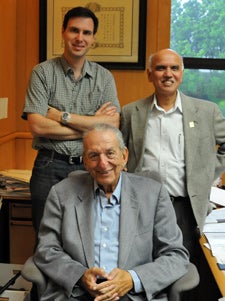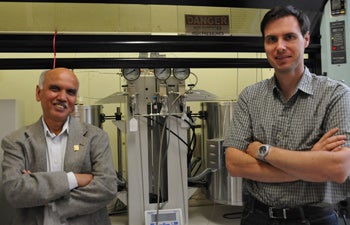Sun Sets on Oil Wells
For more than 20 years, George Olah and G.K. Surya Prakash have quietly and consistently worked toward saving the world.
The USC Dornsife professors’ solutions were recently featured in the Journal of the American Chemical Society in a 17-page perspective.
The perspective was written by Distinguished Professor Olah, Prakash and Alain Goeppert, a senior research scientist, who has worked with the professors for nine years starting as a postdoctoral researcher.
“We believe methanol can be the salvation for humankind once we run out of oil and gas,” said Prakash, the George A. and Judith A. Olah Nobel Laureate Chair in Hydrocarbon Chemistry and professor of chemistry. “The greenhouse problem is relevant for all of mankind. We’re creating short- and long-term solutions.”
Their research centers on the problem of what to do once oil and gas reserves run dry, which is expected to happen this century. Then what? It takes millions of years for natural fossil fuels to form.
Methanol can be made solely with water and carbon dioxide — available everywhere on Earth — and any energy source such as solar, wind, geothermal or safe nuclear energy.
Further, the burning of fossil fuels creates greenhouse gases that contribute to global warming. Methanol is a clean fuel that could liberate humankind from its dependence on diminishing fossil fuels while controlling harmful emissions into the atmosphere.
Inside the Loker Hydrocarbon Research Institute housed in USC Dornsife, the chemists have developed the science to produce methanol that can replace fossil fuels. With technology developed at the institute, methanol can be blended into transportation fuels, used in direct oxidation of methanol fuel cells. Methanol can also make chemical and plastic products — and even proteins for animal feed.

Nobel Prize winner George Olah (seated), G. K. Surya Prakash (right) and Alain Goeppert have developed the science to produce methanol that can replace fossil fuels. The second edition of Olah, Prakash and Goeppert’s book, Beyond Oil and Gas: The Methanol Economy (Wiley-VCH, 2009) has recently been published. Photo by Pamela J. Johnson.
Olah, the Donald P. and Katherine B. Loker Distinguished Professor of Organic Chemistry, earned a Nobel Prize in 1994 for his research on carbocation chemistry — an entirely different topic. The methanol work is Olah’s major post-Nobel contribution. Olah is the institute’s founding director and Prakash is the current director.
“The methanol economy is past the research stage and is in the process of being put into commercial and practical use,” Olah said. “Unfortunately for the time being, not in the United States, but in countries like China and Iceland.”
The high concentration of volcanoes in Iceland gives it an advantage in generating geothermal energy — used for heating and production of electricity. Carbon Recycling International in Iceland, a green company that captures carbon dioxide from geothermal hot water wells and converts it into renewable methanol, has recently started production in a new commercial plant, aptly named the George Olah Renewable Methanol Plant.
The second edition of Olah, Prakash and Goeppert’s book, Beyond Oil and Gas: The Methanol Economy (Wiley-VCH, 2009) has been published and translated into Swedish, Japanese, Hungarian and Chinese — and some of these countries are already adopting the concept.
Currently, U.S. laws allow for only gasoline and bioethanol to be used in fuels in internal combustion engines. But methanol may become an alternative if the Open Fuel Standard Act of 2011 is passed by the Senate and House of Representatives mandating that by 2017 automakers no longer be allowed to make cars that run only on gasoline. The bill calls for alternative fuels such as methanol and fueling stations.

G. K. Surya Prakash (left) and Alain Goeppert of USC Donsife stand in front of their High Temperature-High Pressure Flow Reactor inside their lab for carbon dioxide conversions to methanol. Photo by Pamela J. Johnson.
“The law needs to be changed so that all kinds of fuels can be used,” Prakash said. “Change in the law will make the playing field even. Let the best fuel win — and we think that is methanol.”
U.S. dependence on oil stems from oil’s monopoly over transportation fuel, similar to when salt had a monopoly over food preservation in earlier eras, the bill states. Recently, Prakash had an opportunity to meet with U.S. Secretary of Energy Steven Chu and participate in events held by the United States Energy Security Council in which Olah is a member, along with Alan Greenspan, George Shultz, Robert McFarlane and others.
“I am still a working scientist,” Olah, 84, said. “I am involved in the technical chemistry part of it. I am not involved in the political and commercial part of it. Look, it’s like with your baby. It’s my baby so obviously I’m biased and I hope that the methanol economy will be widely used. And will contribute to solving at least in part some of mankind’s major problems — energy and our continuously deflating fossil fuel reserve.”
The abundance of shale gas in the U.S. and elsewhere in the world has given the methanol economy a huge boost, Prakash said. Largely due to new shale gas discoveries, natural gas reserves in the United States in 2008 increased by 35 percent in two years.
“The newest discoveries of shale gas are a bonanza for the U.S.,” Prakash said. “America need not worry about energy this century. The beauty of it is you can take shale gas and convert it to methanol with simple chemistry. We can substitute gasoline, diesel and all of these fuels with methanol-based fuels.
“Many of our problems in the U.S., the budget crisis and wars in the Middle East, are happening because of our addiction to oil,” Prakash said.
In the late 19th century, petroleum oil, followed by natural gas in the 20th century, began to supplement coal, allowing an unprecedented era of prosperity and development as well as a population boom from less than 1 billion people in 1800 to 7 billion today, the journal perspective says. Presently, about 85 million barrels of oil and 8 billion cubic meters of natural gas are consumed each day.
Nature has given us a remarkable gift in the form of fossil fuels, but it is limited and is being irreversibly used up, the journal says.
“So to substitute oil,” Prakash said, “we have the solution.”